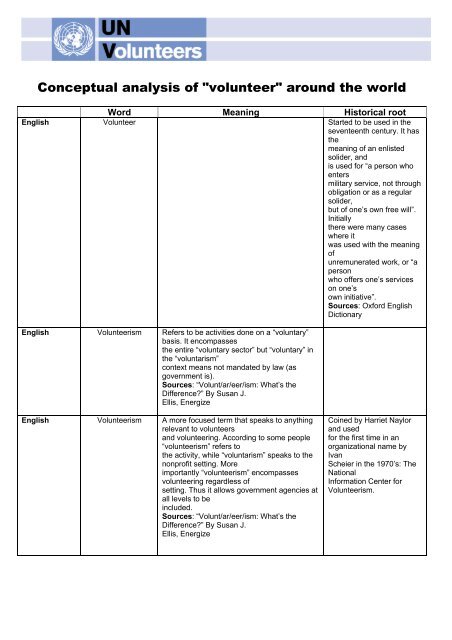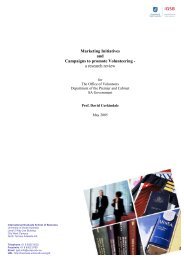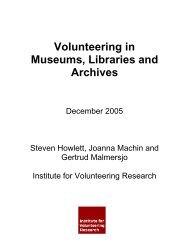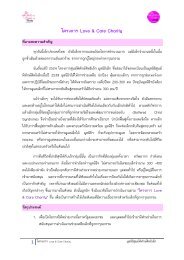Africa fact sheet
Africa fact sheet
Africa fact sheet
Create successful ePaper yourself
Turn your PDF publications into a flip-book with our unique Google optimized e-Paper software.
Conceptual analysis of "volunteer" around the world<br />
Word Meaning Historical root<br />
English Volunteer Started to be used in the<br />
seventeenth century. It has<br />
the<br />
meaning of an enlisted<br />
solider, and<br />
is used for “a person who<br />
enters<br />
military service, not through<br />
obligation or as a regular<br />
solider,<br />
but of one’s own free will”.<br />
Initially<br />
there were many cases<br />
where it<br />
was used with the meaning<br />
of<br />
unremunerated work, or “a<br />
person<br />
who offers one’s services<br />
on one’s<br />
own initiative”.<br />
Sources: Oxford English<br />
Dictionary<br />
English Volunteerism Refers to be activities done on a “voluntary”<br />
basis. It encompasses<br />
the entire “voluntary sector” but “voluntary” in<br />
the “voluntarism”<br />
context means not mandated by law (as<br />
government is).<br />
Sources: “Volunt/ar/eer/ism: What’s the<br />
Difference?” By Susan J.<br />
Ellis, Energize<br />
English Volunteerism A more focused term that speaks to anything<br />
relevant to volunteers<br />
and volunteering. According to some people<br />
“volunteerism” refers to<br />
the activity, while “voluntarism” speaks to the<br />
nonprofit setting. More<br />
importantly “volunteerism” encompasses<br />
volunteering regardless of<br />
setting. Thus it allows government agencies at<br />
all levels to be<br />
included.<br />
Sources: “Volunt/ar/eer/ism: What’s the<br />
Difference?” By Susan J.<br />
Ellis, Energize<br />
Coined by Harriet Naylor<br />
and used<br />
for the first time in an<br />
organizational name by<br />
Ivan<br />
Scheier in the 1970’s: The<br />
National<br />
Information Center for<br />
Volunteerism.
French Volontaire Adj.“Il se dit de tout ce qu’il est en notre<br />
pouvoir de faire ou de ne<br />
pas faire. Qui se fait sans contrainte, de pure<br />
volonté. Qui agit par<br />
sa propre volonté, sans y être contraint en<br />
parlant de personnes”<br />
Sources : Littré (Abrégé, par A. Beaujan)<br />
« Qui agit librement (et non par automatisme,<br />
réflexe ou<br />
impulsions) »<br />
Sources : Le Petit Robert<br />
N. « Personne bénévole qui offre ses services<br />
par simple<br />
dévouement »<br />
Sources : Le Petit Robert<br />
Originated from Latin, this word was in use<br />
during the fourteenth<br />
century. Its meaning is a person who is not<br />
coerced or restrained<br />
other words, a person who moves of one’s<br />
own free will. In the<br />
seventeenth century it was used more broadly,<br />
with the meaning of<br />
an enlisted soldier. It means a person who<br />
voluntarily assumes a<br />
difficult role, and does not necessarily mean it<br />
is done without<br />
compensation.<br />
Sources : Robert French Dictionary and the<br />
Larousse French<br />
Dictionary.<br />
French Volontaire N.“Etat de celui qui sert volontairement, qui est<br />
volontaire”<br />
Sources : Littré (Abrégé, par A. Beaujan)<br />
« Participation volontaire à une action, à une<br />
mission »<br />
Sources : Le Larousse<br />
French Bénévole N. et Adj.« Personne qui fait quelque chose<br />
sans être rémunérée,<br />
sans y être tenue »<br />
Sources : Le Larousse<br />
« Acte désintéressé, grâcieux, gratuit. »<br />
Sources: Le Petit Robert<br />
« Le bénévolat est l'acte de citoyenneté et de<br />
philanthropie le plus<br />
fondamental que nous puissions poser dans<br />
notre société. Il signifie<br />
offrir du temps, de l'énergie et des<br />
compétences de son plein gré et<br />
en toute liberté ».<br />
Latin: Voluntarius<br />
1265-1270 : Voluntaire<br />
1538 : Volontaire<br />
1606 : Engagé volontaire<br />
Sources : Le Petit Robert<br />
Se dit des soldats de<br />
différents<br />
corps formés par des<br />
enrôlements<br />
volontaires pendant les<br />
premiers<br />
temps de la Révolution<br />
française”<br />
Engagé volontaire, celui qui<br />
sert<br />
dans une armée sans y<br />
être<br />
obligé”<br />
Sources : Littré (Abrégé,<br />
par A.<br />
Beaujan)<br />
1866: Volontariat<br />
Sources: Le Petit Robert<br />
Latin : Benevolus<br />
1282 : Bénévole<br />
Sources: Le Petit Robert<br />
Animé de dispositions<br />
favorables »<br />
Sources : Littré (Abrégé,<br />
par A.<br />
Beaujan)
« En se souciant des autres et en suscitant le<br />
changement autour<br />
d'eux, les bénévoles réduisent la souffrance et<br />
les disparités tout en<br />
acquérant des compétences, une meilleure<br />
estime de soi ainsi que<br />
l'occasion d'apporter des changements dans<br />
leur propre vie. Les<br />
gens travaillent pour améliorer la qualité de vie<br />
de leurs voisins et,<br />
ce faisant, ils améliorent la leur ».<br />
« Le service bénévole résulte d'un choix; il<br />
n'est ni obligatoire ni<br />
forcé. Il contribue au bien-être d'une personne<br />
ou de la société dans<br />
son ensemble et s'exerce habituellement de<br />
manière structurée par<br />
l'entremise d'un organisme sans but lucratif ou<br />
du secteur public,<br />
sans compensation financière ni rémunération<br />
d'aucune sorte. Il<br />
existe d'autres formes de travail non rémunéré<br />
comme les<br />
ordonnances de travaux communautaires.<br />
Bien que ces activités<br />
apportent un soutien indéniable à la<br />
communauté, elles sont<br />
imposées par une autorité.<br />
Sources : « Bénévoles Canada »<br />
This word was used in the latter half of the<br />
thirteenth century, but<br />
was not used very much until the eighteenth<br />
century. Its original<br />
meaning is to act with good intentions, and it<br />
means a person who<br />
acts voluntarily under no obligation and<br />
without compensation.<br />
French Bénévole N.“Service assuré par une personne bénévole”<br />
Sources: Le Larousse<br />
“Situation d’une personne qui qui acccomplit<br />
un travail gratuitement<br />
et sans y être obligée”<br />
Sources: Le Petit Robert<br />
1954: Bénévolat<br />
Sources: Le Petit Robert<br />
Portuguese<br />
Voluntario<br />
Japanese Volunteer It refers to “A volunteer soldier. A servant of<br />
the people. A person<br />
who performs community service of one’s<br />
accord without<br />
remuneration.<br />
The origin of “volunteer”<br />
activities<br />
spread to Japan around the<br />
Meiji<br />
Era or the Taisho Era. The
Sources: Kojien Dictionary (Fifth Edition,<br />
1998) and White Paper<br />
the National Lifestyle: Volunteering Enriches<br />
Societies with Tastelinked<br />
Human Relations” by the Economic Planning<br />
Agency of<br />
Japan.<br />
Japanese Yui and Moyai Traditional forms of mutual provision of labor,<br />
which still exist in<br />
various regions. These are activities done for<br />
the common good of<br />
the society, although these are somewhat<br />
obligatory rather than<br />
spontaneous.<br />
Sources: White Paper on the National<br />
Lifestyle: Volunteering<br />
Enriches Societies with Taste-linked Human<br />
Relations” by the<br />
Economic Planning Agency of Japan<br />
word<br />
volunteer” came into<br />
general use<br />
since around the 1960s. It<br />
was first<br />
listed in the Kojien.<br />
Source: Reizo Tsunoda,<br />
ed. “The<br />
Recommendation of<br />
Education for<br />
Volunteering” 2000<br />
Since the “land-based<br />
societies”<br />
started in ancient Japan.<br />
Sources: White Paper on<br />
the<br />
National Lifestyle:<br />
Volunteering<br />
Enriches Societies with<br />
Tastelinked<br />
Human Relations” by the<br />
Economic Planning Agency<br />
of<br />
Japan<br />
Japanese<br />
Koh, Yoriai and<br />
Ren<br />
Mutual Aid” system, which were activities of<br />
social contribution<br />
performed in land-based societies.<br />
Assemblies among village<br />
members, which formed the<br />
mutual aid systems in<br />
villages.<br />
Sources: White Paper on<br />
the<br />
National Lifestyle:<br />
Volunteering<br />
Enriches Societies with<br />
Tastelinked<br />
Human Relations” by the<br />
Economic Planning Agency<br />
of<br />
Japan<br />
Spanish<br />
Voluntario<br />
México<br />
Guatemala<br />
Tequio<br />
Tequio:El tequio es la faena que cada<br />
ciudadano otorga<br />
dependiendo de las facilidades una o dos<br />
veces al mes, es<br />
trabajo que permite la realización de obras de<br />
servicio general:<br />
obras de embellecimiento y de servicio tales<br />
como escuelas,<br />
clínicas de salud, abastecimiento de agua, etc.
Ecuador<br />
Perú<br />
Minga<br />
El sequío<br />
programado por el cabildo o la autoridad<br />
municipal y se realiza<br />
coordinado por el síndico municipal. A él<br />
asisten todos los padres<br />
de familia, madres solteras y viudas. Los<br />
primeros tienen la faena<br />
más duras y las mujeres actividades de otro<br />
orden; preparar agua,<br />
comida incluso muchos casos participan en la<br />
siembra como<br />
también de la cosecha.<br />
El tequio es la institución que evidencia de<br />
nueva cuenta el<br />
comportamiento del ciudadano no asiste al<br />
acto tiene que pagar<br />
una multa o bien reponerlo en otro día. En<br />
algunos casos se<br />
encarcela al individuo que no asiste. Cabe<br />
señalar que esta labor<br />
está penada por la constitución general de la<br />
nación pero se<br />
ejercita a pesar de todo.<br />
Fuente de Información: Taller Regional de<br />
Centroamérica –<br />
Guatemala<br />
Minga: La “minga” o trabajo comunal es una<br />
institución y cual se<br />
basa en dos tipos de mingas:<br />
La minga como trabajo comunal de ayuda<br />
recíproca: Cuando una<br />
persona tiene que realizar un trabajo que<br />
requiere varias personas,<br />
como el rozo y quema para abrir una nueva<br />
chacra, la construcción<br />
de una casa, abrir un camino, ..se convoca a<br />
una minga. El dueño<br />
tiene que proporcionar desayuno al comienzo,<br />
un almuerzo al final<br />
y bebida durante el trabajo. Esta persona, por<br />
su parte, tiene que<br />
participar en las mingas convocadas por los<br />
que le han ayudado.<br />
La minga para obras públicas: El objetivo es<br />
realizar algún<br />
trabajo de mejora del Caserío como arreglos<br />
de la escuela, limpiar<br />
caminos… Los días de minga el Teniente<br />
Gobernador convoca a<br />
todos los hombres a las 7 de la mañana, pasa<br />
lista y reparte por
grupos el trabajo a realizar. Tienen obligación<br />
de acudir todos. En<br />
caso de no hacerlo se les pone una multa que<br />
tienen que abonar<br />
un plazo fijado. El destino de las multas es<br />
para comprar bebidas.<br />
En caso de no abonar dicha cantidad en el<br />
tiempo estipulado,<br />
meten al “calabozo” durante 12 horas. Todas<br />
estas normas<br />
establecen los moradores, reunidos en<br />
Asamblea Vecinal. No<br />
ninguna remuneración por este tipo de trabajo.<br />
Estas practicas tradicionales pudiesen ser<br />
apoyadas a través<br />
legislación que apoye y fomente esta acción<br />
voluntaria, cual<br />
vez pudiese tener un impacto en al<br />
Cooperación Internacional<br />
voluntariado nacional.<br />
Fuente de Información: Taller Regional de<br />
Centroamérica –<br />
Guatemala<br />
Armenia<br />
Ghana - Twi<br />
Kamavor<br />
Atu wo ho akye<br />
adwuma<br />
sacrificial work<br />
Ghana Noboa Form of mutual assistance among farming<br />
communities<br />
Ghana - Twi<br />
Kwaasafo<br />
adwuma<br />
traditional volunteering activities is in the form<br />
of communal labour<br />
Rwanda KWITANGA Volunteer - "to offer yourself or give<br />
yourself up" normally for a good cause<br />
Ubwitange<br />
Yaritanze<br />
Baritanze<br />
Mwitange<br />
Yitange<br />
DUFATANYE<br />
means Volunteerism, or the voluntary spirit.<br />
is the singular/past tense form meaning he/she<br />
volunteered<br />
is the plural/past tense form meaning they<br />
volunteered<br />
is the plural/present tense form for volunteer<br />
is the singular/present tense form for<br />
"Volunteer"<br />
kinyarwanda word used in Rwanda for mutual<br />
aid/self help/working<br />
together
Slovenia prostovoljec Volunteer<br />
prostovoljno Voluntary work<br />
delo<br />
prostovoljstvo<br />
Voluntarism<br />
Togo - Ewe LOLONU NYUI Volunteer Word meaning: GOOD WILL WORK<br />
DOWOWO<br />
Thailand Asasamak which literally means<br />
"apply to do something free of charge"<br />
Japan Bolantia volunteer<br />
Korean jawonbongsa volunteering<br />
jawonwhaldong<br />
A term used by Some people, especially in<br />
advocacy and civic<br />
activity groups<br />
Netherlands vrijwilligerswerk volunteer<br />
Russia dobrovolchestvo volunteerism<br />
Liberia PARTQUARLAY Volunteer in the Gio Tribe<br />
BENGALI Sechchashrom Volunteer<br />
Bhutan<br />
(Nepali<br />
language)<br />
Nepal, India<br />
and Sri Lanka<br />
Shechchaseba<br />
Je nijer ichchay<br />
kaj kore<br />
Seba Prodan<br />
Swyam Sevak<br />
Sewa<br />
Volunteer -- It means somebody working<br />
selflessly for the upliftment<br />
of the civil societies<br />
Bangaladesh<br />
Maldives<br />
Bosnia and<br />
Herzegovina<br />
Kela<br />
Hilex Saabaha<br />
Massakaix<br />
Kurun<br />
VOLONTER<br />
DOBROVOLJNI<br />
VOLUNTEER<br />
VOLUNTEER WORK
RAD<br />
VOLONTERSTVO<br />
VOLUNTARISM<br />
Kenya HARAMBEE pulling together willingly -- The motto became<br />
a national issue<br />
immediately Kenya got her independence from<br />
the colonialists in<br />
1963. It was a challenge on every kenyan to<br />
work hard in building<br />
the nation. People had to contribute their<br />
resources, time, energy to<br />
build the nation<br />
Russia volontior volunteer<br />
South <strong>Africa</strong><br />
Afrikaans<br />
Tsonga Sotsha<br />
volunteer<br />
Venda<br />
Tshiitamune<br />
volunteer<br />
Xhosa and<br />
zulu<br />
Swati and<br />
Ndebele<br />
Sotho and<br />
Tswana<br />
Tsonga<br />
dobrovolets<br />
vrywilliger<br />
ivolontiye volunteer<br />
livolontiya volunteer<br />
Ithaopa volunteer<br />
Sotsha volunteer<br />
volunteer<br />
v olunteer<br />
Venda<br />
Pedi<br />
Tshiitamune<br />
volunteer<br />
Moithaopi volunteer<br />
Niger bogu volunteer<br />
Niger gayia volunteer<br />
Niger Samaria volunteer<br />
Bangladesh<br />
swetcha,<br />
swetcho, sewat,<br />
swayam sewa,
swetcha sewa<br />
Self motivated<br />
service<br />
kela<br />
Shechasewat<br />
Caring for others<br />
Volunteer social work<br />
Shahaja,<br />
shamaj shebok<br />
People helping the less fortunate<br />
Part of the culture where<br />
friends<br />
and family would help one<br />
another<br />
Cambodia Nak smak chet A local word meaning charitable action a<br />
group of people doing<br />
charity work without profit supporting<br />
community work. Volunteers<br />
do a broad range of work responding to<br />
natural disasters and other<br />
community need like mines awareness.<br />
India Swayam sewak Self service referring to what we intend to do<br />
to help one become<br />
Swajamsewak<br />
hindi)<br />
Service for others<br />
Swachandsevak One who offers the self on his own for service<br />
Indonesia Gotongrolyong Working together hand in hand<br />
Iran Basij The mobilization of people<br />
LAO PDR Asasamak Volunteer for everything<br />
Maldives<br />
New Zealand<br />
Maori<br />
Hilex saabaha<br />
massakaix<br />
kurun<br />
Whanaungatanga<br />
Free service<br />
Bringing people together and working like a<br />
family.<br />
Papua New<br />
Guinea<br />
hitaguhu<br />
From Hahan, Bougainville, Papua New<br />
Guinea. This word is used<br />
to describe the responsibility borne by<br />
everybody in the community.<br />
Can be also be used when talking about<br />
building a house or when<br />
collecting resources to offer as a ‘bride price’.<br />
Philippines Bayanihan Desire to help each other Is a traditional idea still<br />
informally<br />
present in villages and<br />
formilized
Tagalog<br />
Bayanihan<br />
Visayan<br />
Spirit/desire to help each other<br />
Pahinungod It is a word<br />
which roughly means dedicating yourself for<br />
the<br />
common good<br />
programmes of technical<br />
assistance invested in the<br />
heart of<br />
the people<br />
Originates from early days<br />
when<br />
people moved from their<br />
homes<br />
when community members<br />
came<br />
together to move houses<br />
Samoa<br />
Sri Lanka<br />
Ala ile pule ole<br />
tautua<br />
sewa<br />
Serve your family<br />
Tanzania Wanaojitolea Volunteer<br />
Guinée<br />
Conakry<br />
Kilés<br />
Sérés<br />
Self-help<br />
Botswana<br />
Mephato Traditional forms of volunteering<br />
Metshelo<br />
Letsema<br />
Molawetsa<br />
Lesotho Matsema assistance<br />
Nigeria Dan Agaji Volunteer spirit<br />
DRC<br />
Luba<br />
Rwanda<br />
Central<br />
<strong>Africa</strong>n<br />
Republic<br />
Bambuilishanga<br />
ni<br />
Dufatanye (in<br />
Kinyarwanda)<br />
Kérema<br />
Koussala ti ndjo<br />
bè<br />
Ndoyé<br />
'Good willers'<br />
Mutual aid/self help/working together<br />
Mutual help<br />
Volunteer service<br />
Volunteering<br />
Arabic Tataua’ Self motivated action/Service The Verb Tataua’ is a<br />
synonym<br />
the verb ”Tanafal”. Both<br />
originate
from the Quran and mean<br />
praying<br />
voluntarily more than the<br />
five<br />
obligatory prayers per day.<br />
Arabic<br />
Musaadat Al<br />
Acharun<br />
Helping the others<br />
Sudan Nafir To bring people together to help someone<br />
from the neighbourhood<br />
or community carry out a certain project. Like<br />
building a house or<br />
providing help during the harvest season.<br />
Originates from the Quran.<br />
It was<br />
used during the war when<br />
civilians mobilised<br />
themselves to fight<br />
against the enemy<br />
Morocco Touiza Bringing people together to help someone in<br />
need<br />
Mali n'gnania-yira It means the action to show our willingness














![[PDF] ดาวโหลดใบสมัคร](https://img.yumpu.com/27792585/1/184x260/pdf-.jpg?quality=85)